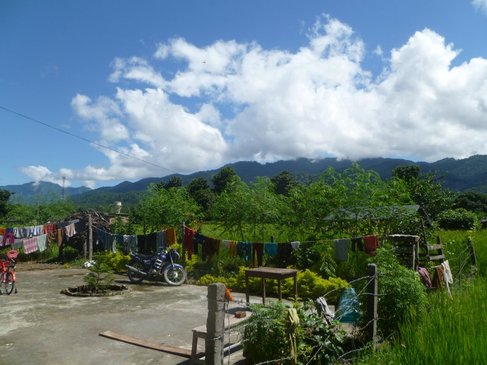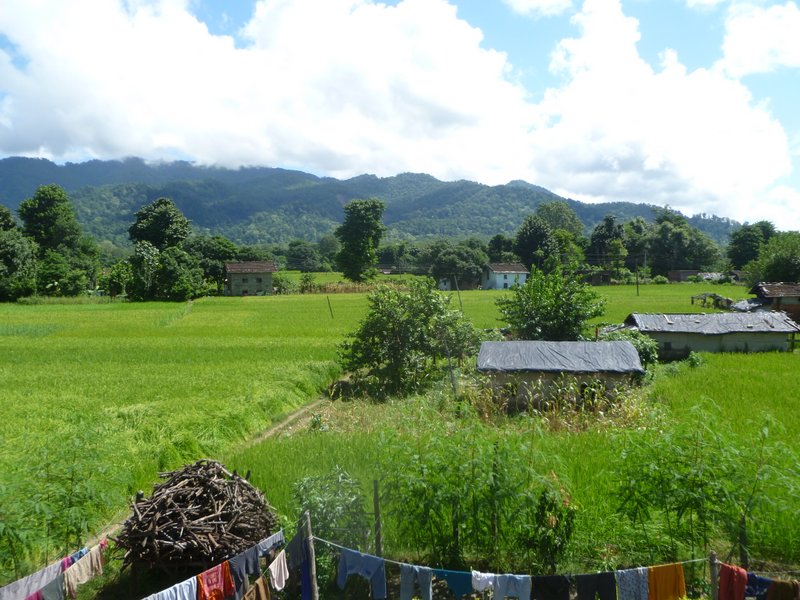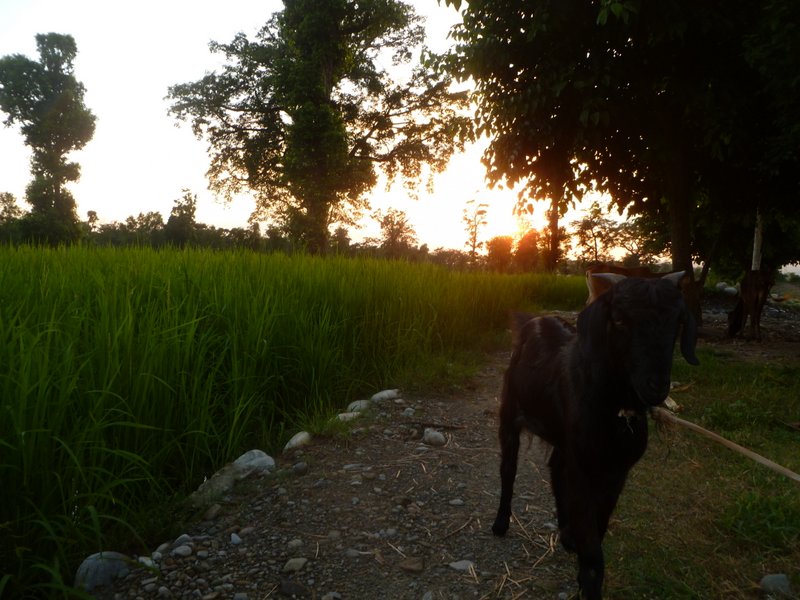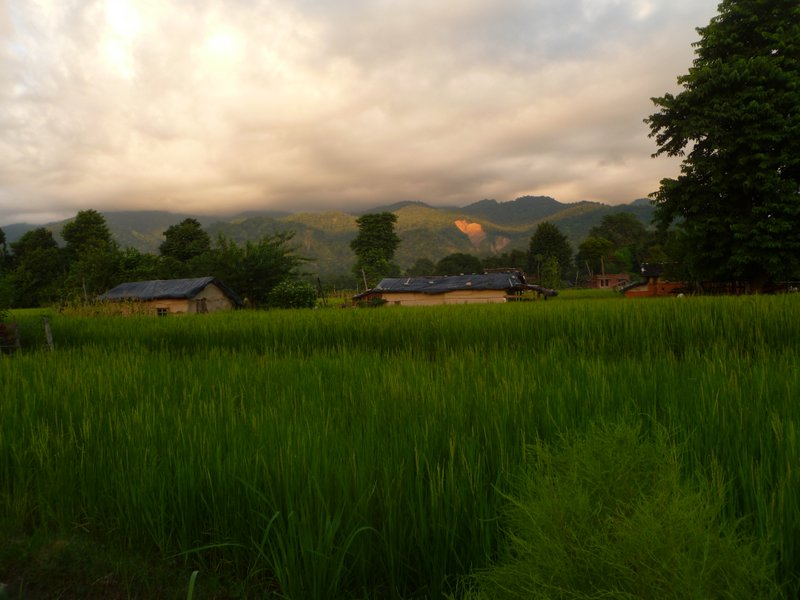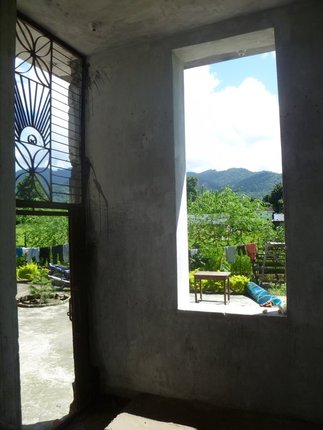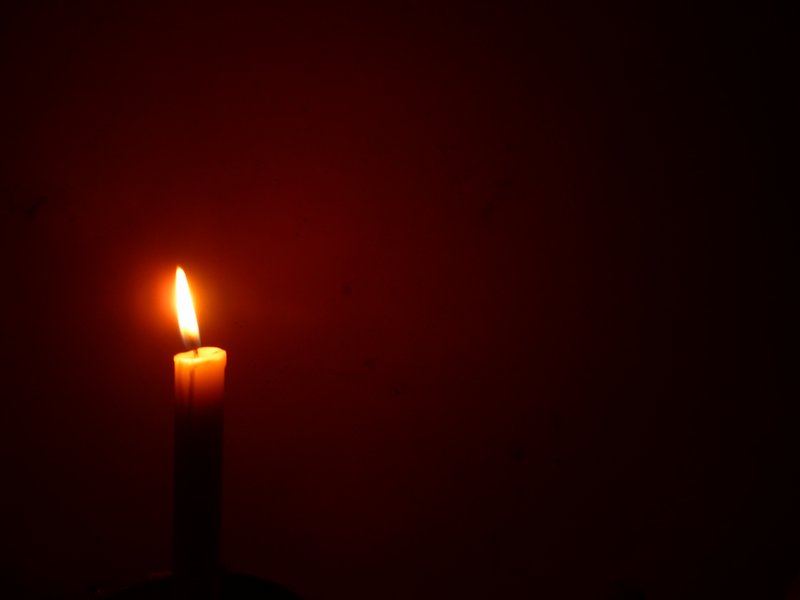On Monday morning our overnight train pulled into the station where we had been told to disembark. Heavy rain had continued all through the night, leaking through the old metal roof of the train car and splashing onto our beds. When we got off of the train, rain was still pouring down on us. We took shelter under a little metal awning with other passengers, discovering as the train pulled away that this “station” was comprised of nothing more than this one, lonely platform next to what seemed to be a very small, lonely town. We dialed the number of our acquaintance’s friend who was supposed to pick us up and take us from there. The call wouldn’t go through. We asked some of the men standing under the shelter with us if any of them knew how to get to the Nepali border from there. They all motioned in a similar direction, some mentioning a rickshaw, others mentioning a horse cart. With two backpacks and only one small umbrella between us, I ventured out from under the awning with the umbrella and the smaller backpack holding our electronics. I walked out to what appeared to be the main road (desolate and small) and was eventually able to hail a horse cart. A. came running through the rain with the rest of our things strapped to his back. The drivers were overjoyed at the prospect of earning $2 to haul us and our gear to the border, so they excitedly lifted up the tarp covering the cart and jostled their other passengers around to make space for us. I sat up front just behind the horse and driver, getting soaked through the opening in the tarp. A. hoisted himself into the back, where there wasn’t anywhere to sit and he was obliged to perch in a half-squatting position with his feet on the “tail gate” for the next several miles as we bounced along flooded, potholed roads that were unpaved in most sections. There were twelve of us stuffed into this primitive wooden cart, along with backpacks and piles of vegetables bound for Nepal.
The courtyard of our eventual destination
We were surprised when the little wagon came to a halt next to a rushing, muddy river, because there was no official immigration office in sight. We put our backpacks on again and began to follow the stream of people onto a bridge across the river. A. ran ahead, sans umbrella, in an attempt to keep every piece of clothing we owned from getting drenched. The fate of the clothes remained to be seen, but he was completely drenched already. I straggled behind him, trying to keep the computer dry under the umbrella in the driving rain and marveling at the power of the murky water churning beneath my feet. We must have been crossing more of a dam than a bridge, and it was several hundred feet long. On the other side, monkeys frolicked in the water outside of a tiny building labeled “Immigration”. We found out we were still in India, and we filled out forms and got our passports stamped. We also learned that the Nepali side was still a kilometer and a half ahead. One of the men hanging out at the immigration office turned out to be a rickshaw puller, and he offered his services and his large umbrella to convey us the rest of the way to the border. He walked us a little ways through the rain to the rickshaw, and about that time a man drove up on a motorbike and asked if we were the foreigners he had been sent to pick up! I don’t know how he got there, but it was a good thing he came, because we had no idea how to get to the village where we were planning to stay, or even what it was called. The rickshaw walla wiped off the wet seat to no avail, and held the umbrella over us as we wedged ourselves onto the narrow bench and piled our things on top of us. The two umbrellas together made a combined canopy that kept our heads mostly dry. The big backpack had already given up the ghost, and we surrendered it to the elements. We bumped along another flooded, pockmarked road that may have been paved at some point in the past, and our new friend on the motorbike followed along slowly beside us. After a steep hill that required to other people to help the rickshaw walla push us (we were unable to move under our stack of bags), we reached an equally small and unofficial-looking “Immigration” office on the Nepali side.
During the time it took us to fill out more forms and get overcharged for visas, our motorbike friend left and returned with a second guy on a motorbike who was sporting a two-headed pancho for A. and our bags to take shelter under. I hopped on the back of the first motorbike and the real adventure began. Not too far down the road, we stopped at a vegetable shop where the owner agreed to give us a huge plastic bag and to cut one side open with a razor—voila: a rain resistant hood and cape for my shivering frame. As we took off again, we were surprised how fast these guys were driving on wet roads. As the rain tried hard to peck out my eyes, I realized for the first time that we weren’t wearing helmets. Fortunately, the road would only permit speed for so long. Within minutes the pavement had turned to a rutted, muddy track. In one place, three-quarters of the road had washed away, leaving only about 12 inches of dirt next to an intimidating slope towards the river below. We still hit the flooded sections with surprising speed, sometimes at a low spot in the road and other times at places where the irrigation canals from the rice fields on either side washed across the road.
Not long after I had decided to relax and enjoy the excitement of off-roading and the water splashing up on my legs, we reached a section of the road that had been completely washed out by the river. More accurately, the river was now flowing across the road—30 feet of fast-moving brown water—and the road reappeared on the opposite side. We were stuck there for several minutes trying to figure out what to do. One of the drivers waded out into the rapids to see how deep the water was. Knee-deep. Not impossible for crossing on foot (although the swift current looked challenging), but certainly too deep for the motorbikes; they could easily get swept downstream. The younger and more adventurous of the two drivers wandered further up the bank and found a shallower place to take the motorcycles across, one by one. It looked like an advertisement for Honda: modest, 100cc motorbikes casually fording a river and rolling over loose rocks in the middle. Some villagers wandered over about that time and asked us where we were going. They were thoroughly confused when we were unable to tell them the name of the village we were trying to get to, since we were going to such great lengths to get there! These village men arrived at a good time. A. and I waded into the river, holding onto each other for stability, and they were crossing at the same time. Right in the middle, where the current is strongest, I started to lose my footing. All of our electronics were strapped to my back, and A. was far enough behind me at this point that we couldn’t really steady each other. One of the villagers reached out to grab my hand and helped me across the rest of the way. On the other side of the river, we were feeling quite accomplished, and laughing at the absurdity of the situation. It was pouring rain in the jungle, and here we were, teeth chattering, riding motorbikes with total strangers along a completely insane road, to get to a remote village whose name we didn’t even know.
Little did we know that in the remaining four kilometers to the village, we would have to cross similar streams three more times! At one of them, the younger driver decided to make a go of it with A. and all of our gear still on the bike with him. Despite the bike having died twice in lower water, it somehow made it across that time, with only a little bit of nerve-wracking bouncing and tilting right in the middle. A plastic bag holding our shoes also fell into the water at that point, but the second driver waded into the river, sprinted down the opposite bank and caught them just before the disappeared around the bend!
After nearly an hour on the motorbikes, we arrived at the home of the family with whom we are planning to stay for a few weeks. They hung up a string across the living room for us to hang out all of our wet clothes to dry, gave us chai and lunch, and showed us to our room to take a long nap. The rain hasn’t let up yet, and the family says they haven’t even been to the market in three days because of it, but if the weather ever does clear us we’re looking forward to exploring this beautiful area. We’re surrounded by bright green rice fields and big trees, and we can barely make out the silhouettes of mountains in the distance through the mist.
